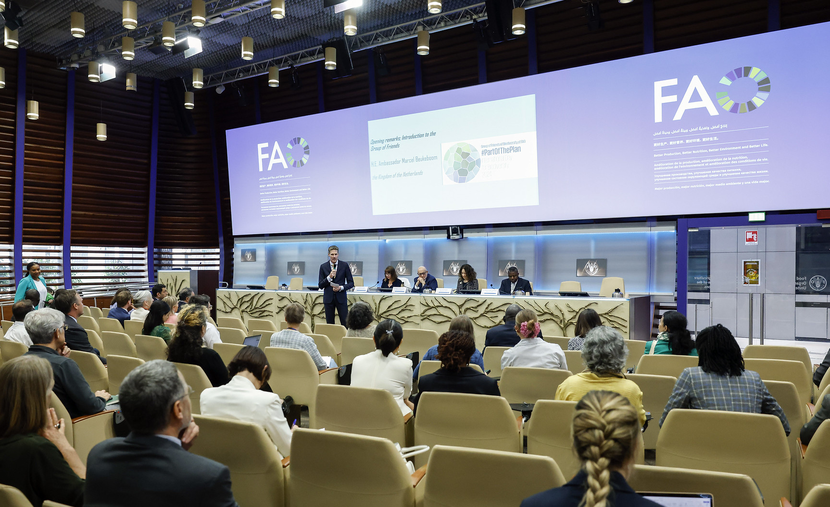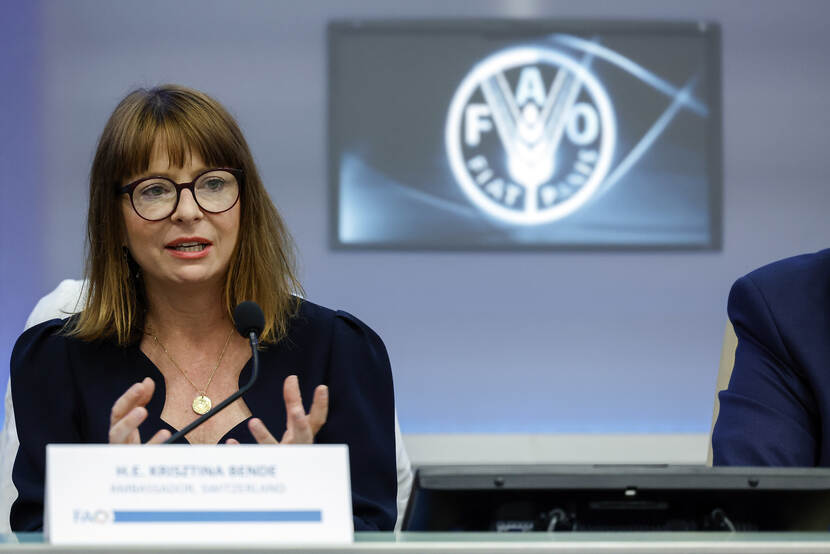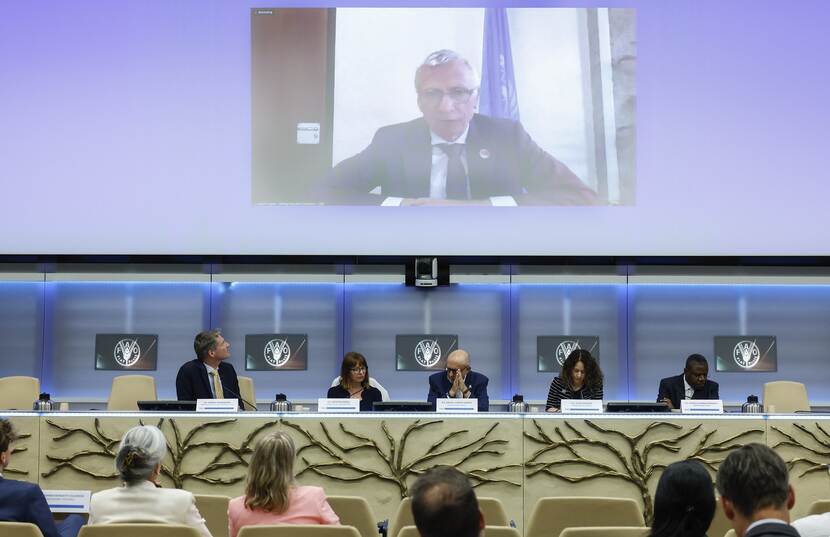International Day for Biodiversity: Be Part of the Plan!
This year’s International Day for Biodiversity took place on May 22 and put the spotlight on the implementation of the Global Biodiversity Framework, in short: The Plan. As chair of the Group of Friends of Biodiversity in Rome, the Permanent Representation of the Netherlands hosted a well-attended event to raise awareness about biodiversity, from the multilateral to the national level. Ambassador Beukeboom moderated the discussion, challenging the speakers to connect national experiences to global biodiversity objectives.

Looking ahead at COP16 in Colombia
Ambassador Benedetti shared Colombia’s priorities for the upcoming Biodiversity COP16, which will be organized in Cali. Firstly, preventing the loss of species and adhering to the targets of creating and conserving protected areas. Secondly, creating better systems for sharing genetic information concerning biodiversity and improving the sharing process. Thirdly, agreeing on the flow of financial resources to developing countries. Developing countries are dependent on this flow of resources to meet their deadlines and demands.

Roundtable discussion with Switzerland, Kenya, Canada, and Mexico.
The main part of the event was the roundtable discussion. Member states shared country perspectives and challenges in implementing biodiversity targets.
Switzerland noted the challenge with conflicting objectives between food security and biodiversity objectives. Ambassador Bende stressed the need for a holistic view and to address food security and biodiversity policies integrally. As a priority, FAO should maintain a continuous focus on and creation of data regarding what works and what does not in order to propel food systems transformations which stimulate biodiversity.
Kenya reminded the attendees that without healthy soils we cannot have healthy biodiversity. Ambassador Matwang’a stated that crop diversity is needed to create long-term change and stop the pollution of our environment. However, without financial resources, little can be done, and focus should be put on creating cross-sectoral approaches and partnerships. Finally, we should be wary of the tradeoffs between more food production, to care for the growing global population, and nature conservation.
Canada highlighted the importance of developing a path to global commitments that support farmer livelihoods without forcing a choice between conflicting priorities under frameworks like the G7 Nature Compact and the Global Environment Facility (GEF). Additionally, Ambassador Golberg stressed the necessity of gender-responsive and indigenous-led initiatives, cross-sector partnerships, and empowering developing countries, particularly in Africa, to take the lead in biodiversity efforts. As a last message, the Ambassador advocated for the three UN organizations in Rome to work together and create alignment around the three strategies for biodiversity. By doing so they can jointly influence agrifood systems transformations, maximize synergies and minimize trade-offs.
Mexico, one of the globally most biodiverse countries, emphasized the importance of political leadership in agriculture to push forward agrifood systems transformation. Ambassador García-Winder highlighted the need for new policies, institutions, and organizations that minimize trade-offs between farmer income and food costs, protect native crops like corn and cotton. Doing this whilst fostering a societal appreciation for the true value of food, plants, and animals. Finally, alignment should be created with other FAO strategies to address biodiversity losses, particularly those in livestock.

Insights from Biodiversity advocates
David Cooper, Acting Executive Secretary of the Convention on Biological Diversity, who works on the implementation of the global biodiversity framework, also shared his insights, live from Nairobi. He stressed the importance of more monitoring of progress towards increased biodiversity and emphasized that nothing is more important for biodiversity than agriculture. Without a sustainable agricultural system, we cannot improve global biodiversity. This means that we may have to compromise in the short term, to create a food system that balances food security and biodiversity objectives in the long term.
Lastly, Kaveh Zahedi, Director of the Office of Climate and Biodiversity at FAO, emphasized the critical importance of sustainable biodiversity use, meaning the use of natural resources at a rate so that earth can renew them. He also advocated for a novel approach that integrates agriculture and food systems as essential components of any successful biodiversity plan. Policy coherence across all levels of government is required to transition from planning to effective implementation, ensuring that new strategies are inherently food systems-focused. There is an inextricable link between food and biodiversity, which calls for comprehensive and inclusive efforts to protect and sustainably use biodiversity while supporting agricultural livelihoods.
Conclusion
In conclusion, the event provided valuable insights into improving global biodiversity by connecting national experiences to shared global issues. And with over 200 participants, it can easily be said that there was significant attention for biodiversity. One thing is clear: we need to transform our food systems holistically to protect and enhance biodiversity for the future. This transformation requires building partnerships, leveraging diverse knowledge, and ensuring policy coherence at all levels of government. In short, we all have to be part of the Plan!
More information
You can find more pictures of the International Day for Biodiversity 2024 event here.
If you wish to watch the discussions, you can find a recording of the event here. The password is: IDB2024+
Author of this article: Pieter J.M. van Dalen